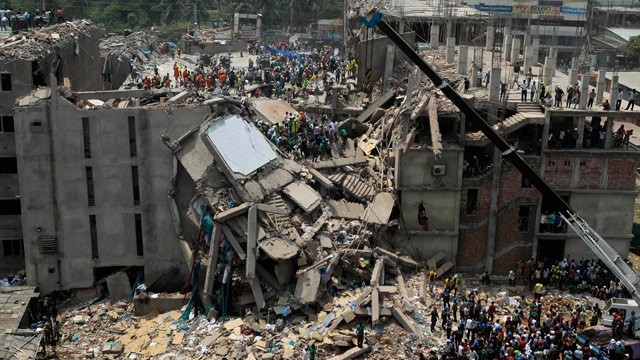WELCOME TO THE ARCHIVE (1994-2014) OF THE MAQUILA SOLIDARITY NETWORK. For current information on our ongoing work on the living wage, women's labour rights, freedom of association, corporate accountability and Bangladesh fire and safety, please visit our new website, launched in October, 2015: www.maquilasolidarity.org
December 19, 2014

Rana Plaza collapse. April, 2013
As we near the end of 2014, the Accord on Fire and Building Safety in Bangladesh reports that it has completed safety inspections in 1,100 apparel factories covered by the Accord, and more than 500 corrective action plans have been approved to date. The inspections are overseen by Brad Loewen, a fire inspection engineer formerly employed by the City of Winnipeg, Canada.
A total of approximately 80,000 fire and building safety hazards were identified by independent safety inspection teams. Nineteen inspected buildings that fell below acceptable structural safety standards had to be temporarily evacuated to avoid possible injuries to workers. These temporary evacuation cases were submitted to the Review Panel established by the National Plan of Action tripartite committee.
According to Accord Executive Director, Rob Wayss, the Accord is currently working intensively with factory owners and Accord signatory companies to achieve remediation of the safety hazards identified in the inspections and to ensure the required financial resources are in place for the safety remediation to be completed within defined timelines. "In cases of insufficient cooperation or non-compliance, the Accord, together with the company signatories sourcing from the factory, is intervening to achieve compliance and avoid the need to invoke the Accord penalties for refusals to remediate," says Wayss.
There is no question that workers' lives have been saved as a result of the Accord's inspection program.
According to Wayss, beginning in 2015 the five-year program will also focus on the establishment of health and safety committees in the factories in which workers elect their own representatives and in training the worker and management representatives who will serve on those committees and lead the building of safety and health monitoring systems at the shop floor level in their factories.
Wayss reports that the Accord is supporting 10 persons nominated by the union federations that make up the IndustriAll Bangladesh Council, eight of whom are former garment workers, to act as resource people to communicate with workers on the findings of factory inspections and corrective action plans. This is in addition to the case handlers who manage the remediation work with Accord engineers, factory owners, Accord brands, and labour organizations, and who also receive complaints from workers when their employers fail to take corrective action or retaliate against workers for filing safety complaints.
Under the Accord, workers have the right to file anonymous complaints and to refuse unsafe work.
MSN is a witness signatory to the Accord and a member of the Accord's Worker Participation Working Group, which provides advice to Accord staff on the worker participation aspect of the program.
To date, close to 190 retailers and brands worldwide have signed the Accord, yet only one Canadian company has done so, Loblaw (owner of Joe Fresh).